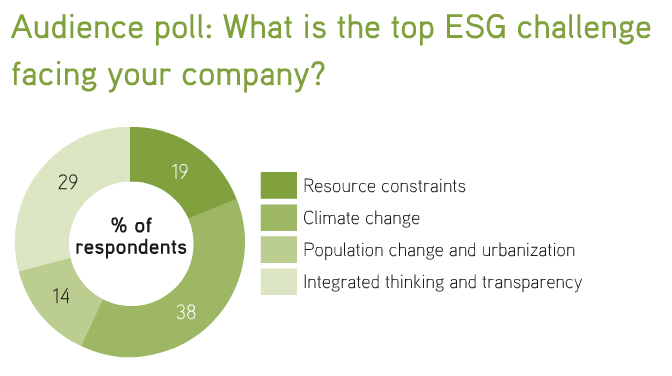The final session of the IR Magazine Think Tank - Euro Leaders 2015 tackled sustainable communications
Appropriately enough, the final discussion session at the IR Magazine Think Tank - Euro Leaders 2015 tackled the need to consider the future - and your company's impact on it - as a panel with corporate and investor representation considered different approaches for engaging shareholders on sustainable value.
On the agenda
|
The first topic up for examination was how to change the mind of companies that do not already consider sustainability an important reporting or disclosure topic. One IR practitioner, whose company supports a program of boosting investor engagement in exactly this way, said it was all about making corporate and sustainable strategy one and the same, rather than two disparate elements of a greater plan.
Following that, she continued, the best route for success is to consider how you can measure sustainable criteria (see Measuring materiality, below). 'Investors want to be able to work out how such issues will affect them in a long-term business model,' she explained. 'Succint messages are best - a quick slide deck rather than a 40-page document. This shouldn't really be considered as something different or separate from good IR.'
Sustainable data should be seamlessly included in interim statements, annual reprots and other corporate documents, the members of the panel agreed. 'It provides a hook for the interested investor without alienating others,' one IRO suggested. 'Don't feel you have to tell investors what they want to hear, but do include sustainability information in your short-term reporting cycle.'
Value drivers
Another panelist said his company saw sustainability as having four value drivers: it promotes growth, lowers costs, allows for risk to be managed more easil and for trust to be improved. This is particularly true when applying sustainable principles through a company's supply chain.
'There's a great deal of pride at the company about how engaged people are, and it's increasing,' he said. 'We feel you might eventually see a causal link between sustainable practices and improved growth.'
| Measuring materiality There are plenty of frameworks and reporting standards for keeping investors informed of the materiality, or physical impact, of an issuer's operations. For some IR teams this boils down to an environmental profit and loss account, which provides a metric to measure and monitor the footprint of the company's operations and suppliers. The panel largely agreed that the guidelines set out by the Sustainability Accounting Standards Board are among the most rigorous when it comes to shaping financial reporting, with one buy-sider adding that integrated reporting headlines - such as those established by the International Integrated Reporting Council - were also picking up support among investors and analysts. |
The right attitude to sustainabilit really needs to start at the top of the company, one investor at the think tank pointed out, describing a luxury brand's CEO who, on the back of a thorough, sustainability-minded report from PwC into the entire group and its supply chain, radically changed its future strategy. The endgame, the buy-sider explained, was to 'keep product costs similar but keep costs to society and the environment down.' It's a methodology the speaker has since suggested as an option to other companies.
Beyond that, it's something investors are actively campaigning for. 'We asked companies what they were doing to further cause, particularly public policy advocacy, and they said nothing,' one panelist said. 'Brussels - and other regulators - want to hear about investors and companies. I encourage you to try [to engage them].'
The panelists agreed there are a lot of approaches to sustainability that are exciting, but no approach can be considered perfect and IROs should start to consider sustainability wherever they can. 'If you can have these sustainability hooks in your reporting and outreach, you can encourage more questions that are easy to proactively talk about,' one IRO added. 'There's a lot of experimentation, and many greenfield approaches, but we think sustainability will be huge going forward.'
Another IR professional agreed. 'We understand you're putting your head above the parapet,' the attendee said. 'If you're doing something that marks you out from the crowd, you should reach out to investors. You never know what support you might find to help you and your team make that information work for you.'
Download session materials
This article appeared in the fall print issue of IR Magazine










